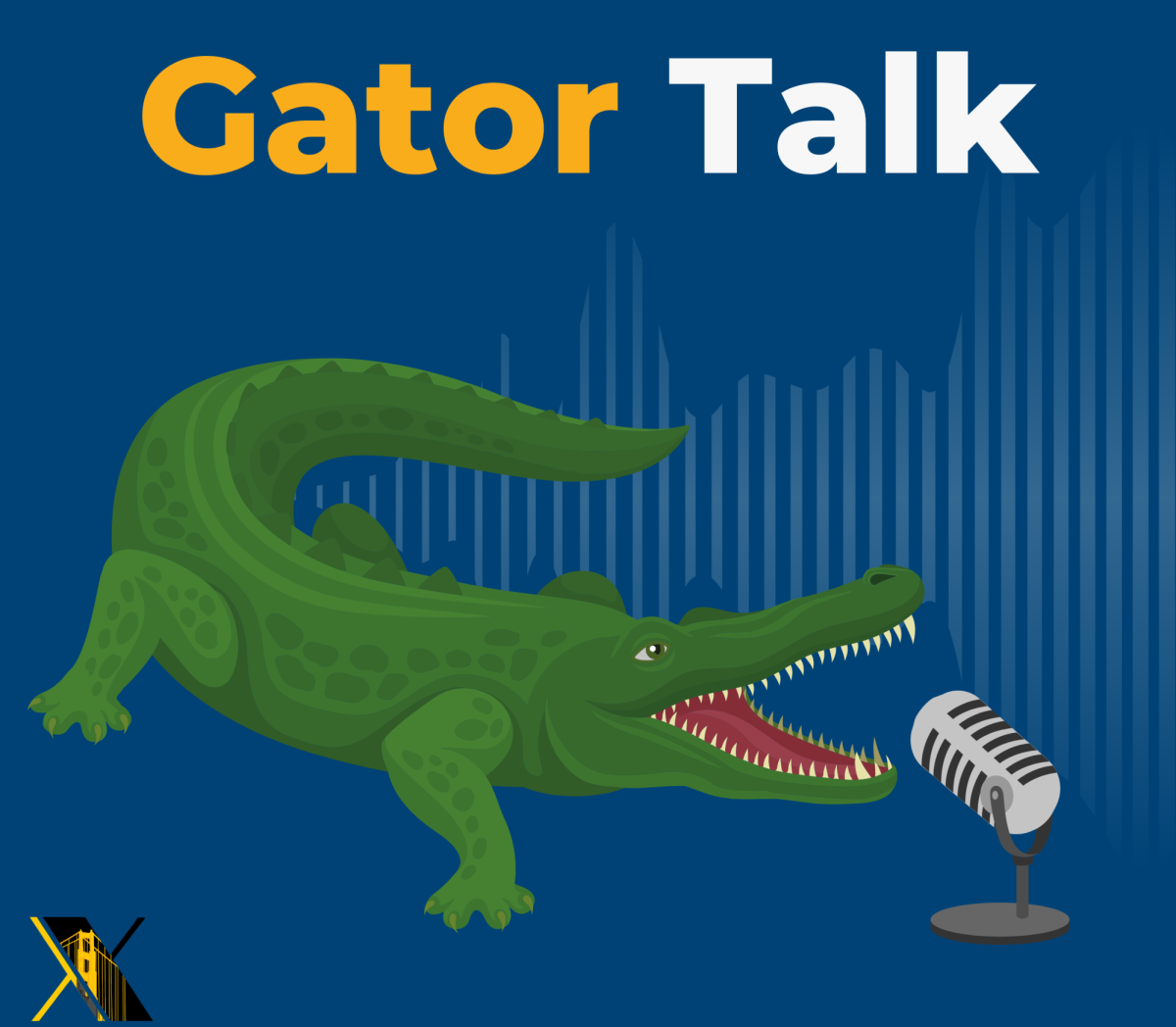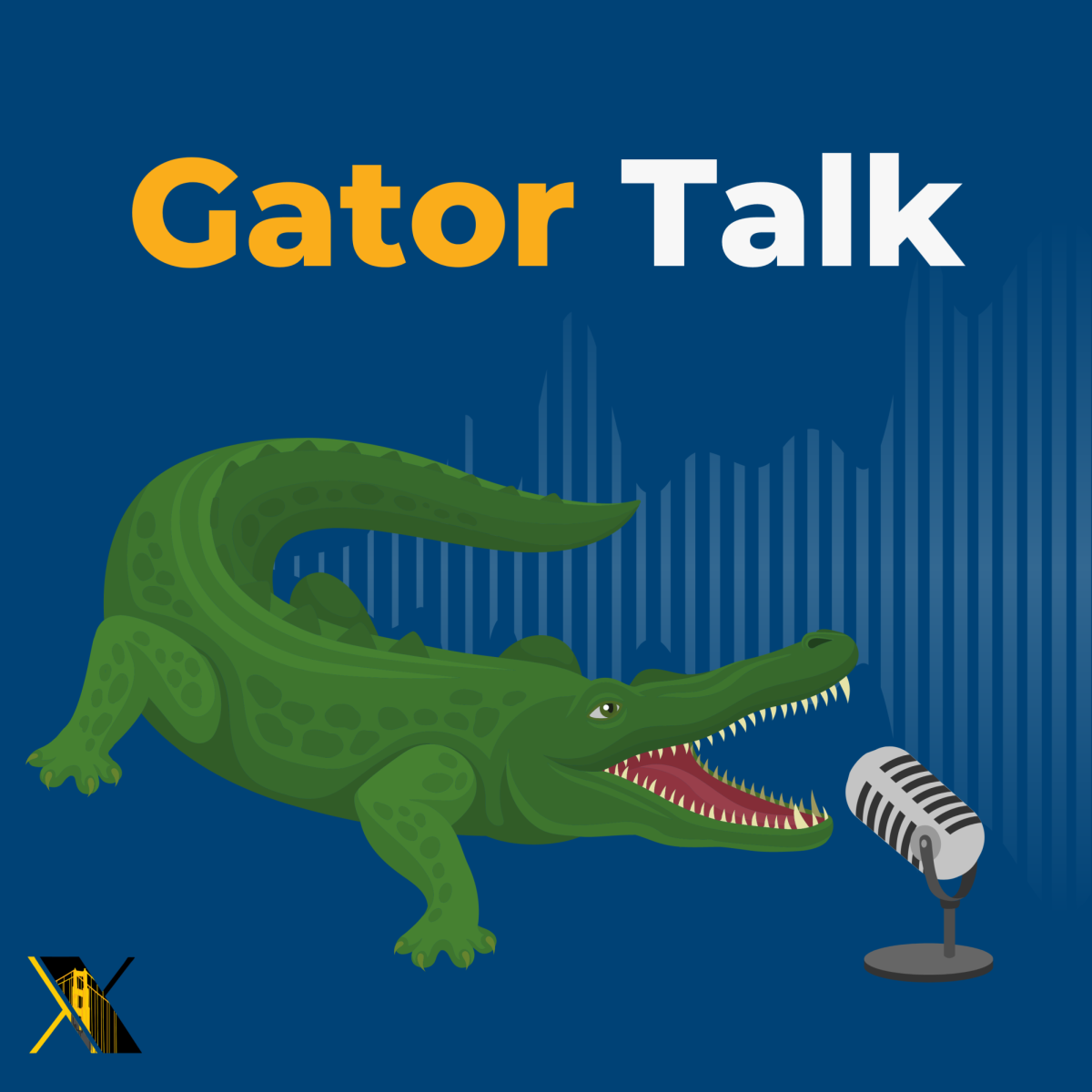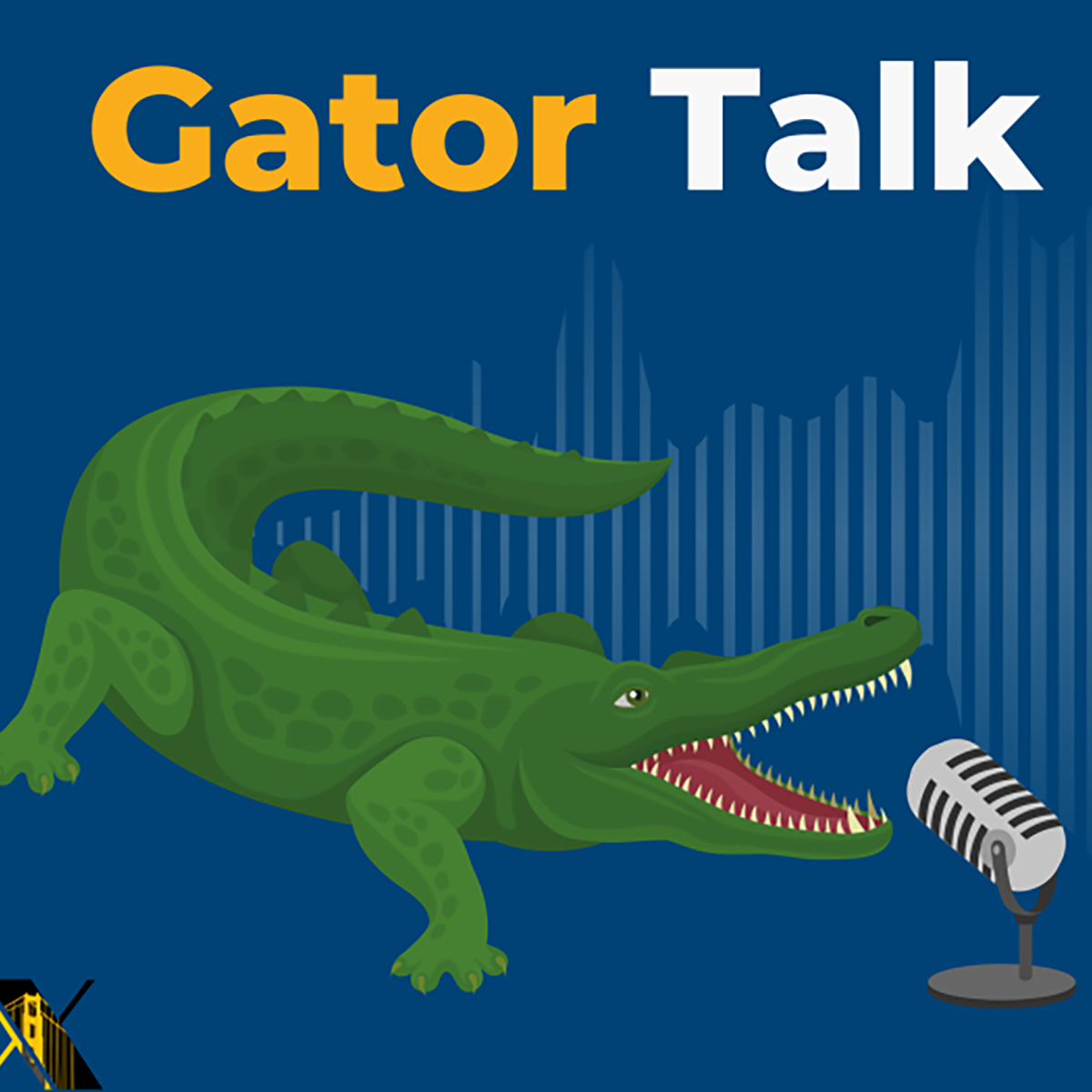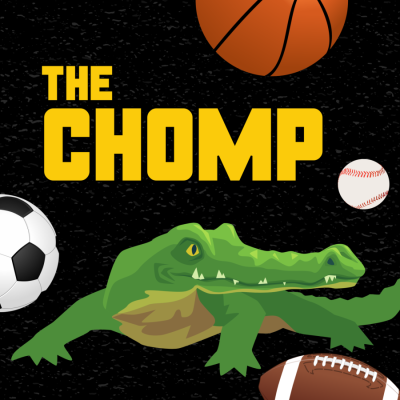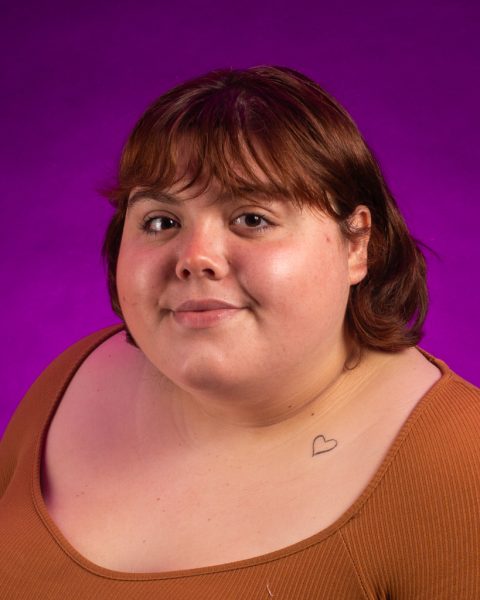Intro
Natalie Metcalf: Welcome back to Gator Talk. I’m Natalie Metcalf from GGX. Today, we’ll be talking to Monica Perry from EROS, Education and Referral Organization for Sexuality. Today, we will be discussing asexuality and some of its misconceptions.
Interview
Monica Perry: Hello, I’m Monica. I’m a part of EROS, the Education and Referral Organization for Sexuality. I’m the office assistant. We provide safe sex supplies and sexuality-related events on campus.
We recently did a kink and bondage workshop. We do these kinds of events and I help support these events.
Natalie: So today, we’re going to be talking about asexuality.
Monica: Yes. My favorite topic.
Natalie: And you brought a flag. And that’s super cool. So, if you could just tell me about asexuality and what the definition is, and if you are asexual.
Monica: Yes, I am asexual. Asexuality, the hardcore definition of it is, a person who doesn’t experience sexual attraction. It’s the opposite of allosexuality, which is someone who does experience sexual attraction, and that’s most people. Most people won’t realize that they’re allosexual because it’s just the norm. But people who are asexual need that word, you know, to describe people who are the opposite of them. It’s like cisgender and transgender. You don’t realize when you’re cisgender until you’re talking about transgender folks. And so for asexual people, you won’t realize that you’re asexual until you’ve discussed, you know, how you fit into allosexuality, which is usually when you realize you’re not. You don’t fit into that.
Natalie: When did you realize you were asexual? What was that process like?
Monica: It was a very long process, to be honest. I started thinking about it in my freshman year of high school when I was 15. I had come from a very protected school where no one really talked about sexuality. We just knew we were kids and we were studying kids, and we’re like, “We’re not going to talk about this.”
We had crushes and stuff, but it was very light stuff. And then when I went to high school — it was entering like a public high school — everyone came from different schools, everyone had very different experiences from me, and people started asking me, you know, what’s your sexuality? It was a common topic and I was like, “Oh, I thought it was too early for me to be thinking about these things.”
So I started to consider it, and I was like, “You know what? I don’t think I feel that much differently between girls and guys, so maybe I’m bisexual.” But eventually, over time, as I came to consider, I kept considering it, I kind of realized that my feelings towards other people were very different from other people’s feelings.
Like, I didn’t particularly see someone and think, “Oh, I want to have sex with that person.” It’s like, or even when I had crushes, it wasn’t necessarily, “Oh, I want to have sex with this person.” It was more of, “I really like you. I am really attracted to you. I think you look nice. I think your personality is great. I think I could forgive anything you could do.”
But it was about three years ago, when I was about 22 or 23, that I finally decided, you know, I’m going to accept this label of asexual for myself because I feel like that’s the best way to communicate how I feel right now. Because although I’m still discovering how I might want to incorporate or not incorporate sex into my relationships,I’ve decided that the way I present myself to other people, the way that I feel the need to communicate my sexual preferences, is by saying I’m asexual. I’m asexual. I’m not attracted to anyone. But that doesn’t necessarily mean anything towards whether I want to have sex kind of thing.
Natalie: That’s interesting. That kind of raises the question of, do asexual people date? What does dating look like for asexual people?
Monica: Dating can be very different for asexual people. Some asexual people are interested in sex and they might still want a relationship, but that’ll look very different for other people. Some people that I’ve talked to can’t imagine, relationship — the pool of sexual people I have met can’t imagine a relationship without sex or without that being the primary goal of a relationship.
But for asexual people, like, there’s still intimacy, there’s still a closeness. There’s still a need to have someone close and intimate to you — someone who feels special to you. There still might be that aspect of it. There are, however, also people who are asexual and aromantic who might not be interested in having a relationship.
Even aromantic people don’t experience romantic attraction. Even then, there are some people who may still desire a relationship even though they don’t experience romantic attraction. It’s like they might not feel differently towards you. They might still feel platonic attraction towards someone, but they decide that for some reason, they still want a relationship for one reason or another.
Those are very personal reasons. They can be very, very varied across people. But for asexual people in general, each person has to decide for themselves what they’re comfortable with, what they want from a relationship. Like, are they okay with having sex in the relationship? And some people are, but that doesn’t make them any less asexual.
Because asexuality — asexuality isn’t an attitude towards sex. Asexuality is a sexual orientation. Asexual people can still get something out of sex if they want to. Some asexual people are completely uncomfortable with intimate touch and such, and that’s perfectly okay. Obviously. But some asexual people may choose to have sex because, you know, it still feels good.It might still give them a sense of intimacy with their partner. But it’s really a choice of what you want to do with your body. Asexual people could still do whatever they want with their bodies. But it’s not necessarily something that every asexual person wants. And they can decide for themselves whether or not they want sex to be a part of their relationships.
Natalie: That’s really interesting. I’m bisexual. I feel more comfortable being in an active sexual relationship with women than I do being in an active sexual relationship with men.
And for a long time, I thought I was gay because whenever I was like, imagine having sex with a guy, it was like, I don’t really want to. I would prefer that — I would feel more comfortable and close with being with a woman. But I still like guys. I’ll still see a guy and be like, oh, he’s attractive.
Like, I would be willing to be in a relationship with a guy, but that sex part is still, like, not there yet. You know what I mean?
Monica: That also brings up the idea of compulsory heterosexuality. Because some people — and I’m not saying this is the case for you —but some people, might not be attracted to men sexually, like lesbians or asexual people, but still feel the need to socially be attracted to men because there’s a social reward for being attracted to men, or attracted to women for asexual men.
But, there’s still other types of attraction as well. There’s aesthetic attraction. That’s not necessarily sexual attraction. Like, you could look at someone and think, oh, I really like the way they look — I really like the way they look and that affects me, the way I feel about that person.
For me, I experience that a lot. I’m like, oh, that person looks nice. I feel like I could be in a relationship with them, but it’s not necessarily a sexual attraction. There’s romantic attraction, which could be — I really feel a connection with this person. This person feels special to me. I want to be in a relationship with them. I want to be exclusive with them. There’s a lot of ways you can go about it.
Natalie: Tell me three things that you have learned about being asexual.
Monica: Oh, gosh.
Natalie: If there are more than three things or if there are like two or just one…
Monica: I think something to know about asexuality is that it’s, it’s a spectrum. It’s like it could be very different for very different people. It’s as broad as the allosexual spectrum is. People can be gay, straight, bi and have a range, diverse attitudes towards sex. One of the things that I wanted to discuss, about misconceptions is, hypersexuality versus asexuality.
Natalie: What is hypersexuality?
Monica: Hypersexuality is a disorder. People often make mistakes and put it on a spectrum with asexuality. It’s like, oh, are you more hypersexual or are you more asexual? And that’s completely incorrect because hypersexuality is a mental disorder where you have obsessive sexual thoughts and you tend to be — you might be considered a sex addict. While asexual is a sexual orientation that simply does not experience sexual attraction, the two are not mutually exclusive.
You could be asexual and have obsessive sexual thoughts. You can be asexual and be a porn addict, you can be asexual and have sex frequently if you want to. Asexual people can have a high or low libido. Asexual people can do whatever they want and that includes having a sexual side to them.
I think for me, something that I’ve had to figure out is my comfort level and desire to have sex with people in relationships. I don’t mind sex personally. I think it can feel good. I think it’s kind of just like an activity for me. It’s like playing soccer or something.
Natalie: Nice. That’s a good comparison. Playing soccer versus having sex.
Monica: Because it’s not necessarily something I want to do constantly, but I think that’s fun to do sometimes. Some people really like it. Some people play soccer professionally. People do it all the time. They make it their obsession, or they’re just something that they do completely because they like it.
Some people don’t like soccer, some people don’t like sex that much. And then it’s like, okay, that doesn’t do much for me. I’m not going to engage in that very often or at all. And that’s something that can happen to any asexual person. Some people I know are very into sexuality. They may or may not be porn addicts, but they aren’t comfortable with physical intimacy.
And then there are other people who are just not interested in sex at all who just they’re not comfortable with physical intimacy. They’re not really interested in the idea of sex. They’re not really interested in the idea of sexuality or intimacy, except for perhaps emotional intimacy. But they have a hard time experiencing that with people, because other people — allosexual people tend to experience intimacy the most through sex.
Something I recently heard within EROS, while working for EROS, was that for some people, there’s nothing better than sex. It’s like if you tried to do one thing better than sex would be so hard for some people, because it fulfills all their needs, essentially the needs for emotional intimacy, comfort, attention.
It’s just very satisfying for them emotionally, physically. For me, there’s a lot of things better than sex. There’s like, my favorite food is better than sex.
Natalie: What’s your favorite food?
Monica: Oh, that’s a great question. Oh gosh, it changes by the day. I love my mom’s enchiladas. Better than sex, way better than sex.
Mascara called “Better Than Sex” is probably better than sex for me. But sex is still something I personally enjoy. But it’s not something I do frequently because it’s difficult to find a partner. And I’m not sure if I want that in my romantic relationships, because I could make things more complicated because our feelings are very different toward sex, I think.
So I think dating that way could be very complicated for asexual people. I think two asexual people who are both not interested in sex would certainly get along the best. But again, attitudes towards sex can range, significantly for asexual people as well.
Natalie: What would you like students to know about asexuality, if they maybe are questioning themselves if they are asexual?
Monica: Right. I would say just keep in mind that the core of the asexual identity is simply not experiencing sexual attraction towards others. You can have a very broad range of attitudes towards sex. You can be asexual and have sex. You can be asexual and have had sex and no longer wish to have sex. You can be asexual and still want a relationship if you want to, or if you don’t want a relationship at all. That’s also okay. These are all things that are personal to you. For reference, which I could have used several years ago, sexual attraction is having sexual feelings for a specific person, not necessarily sexual feelings in general.
You can have sexual feelings. You can have your own side of sexuality. You can be interested in fictional characters. You could be interested in theoretically being involved with someone. But still, if you don’t, if the idea kind of just disappears when you’re in front of a real person, you might be asexual.
Natalie: Okay, so it’s more of like, sex in theory, but when it comes down to it, most definitely not.
Monica: Yes. It’s something that I see a lot of discussion about. Again, a lot of the discussion I’ve personally found helpful has been the discussions in the lesbian community.
Natalie: You did answer some of the questions of the misconceptions —
Monica: Oh, I have plenty more.
Natalie: There are lots. Okay. Let’s go through the list of misconceptions.
Monica: Or perhaps I did cover them.
Natalie: The main one was hypersexuality.
Monica: Yes. My main ones are that asexual people — there’s the idea that asexual people can’t have sex. And I’ve seen under comments sections of like reels about asexual people, they’re like, oh, you’re not asexual. You must be greysexual because you have sex sometimes. It’s like, no, that’s not what that means.
Greysexual is someone who occasionally experiences sexual attraction. And they’re on the gray spectrum of that.
Natalie: Sounds like it’s very, I don’t know if this is the right term, but, like, to each their own.
Monica: To each their own. Yes.
Natalie: To each their own. What’s the community like?
Monica: To be honest, because it’s a very small community it’s hard to really find it. I personally haven’t created a community so much as individual connections, but I think generally asexual people who are like trying to actively be part of the community are very well-versed in, you know, what’s the difference between the attractions? Do you want sex or do you not want sex? How do you feel about these things?
And understanding that, it can be very different for different people. I think asexual people can be very understanding of different people. I think they understand they are part of the LGBTQIA± community. And they really know how to accept people who are different from them because they know what it’s like to be the odd one out as well.
Asexual people, I think, look to be very outspoken at times. They want to be open about who they are, but oftentimes end up being on the quieter end regardless, because there aren’t already figures in the community to lead us as much. Even books, there are very few books on asexuality, but the few that there are, are pretty good like “Ace” by — I think her name is Angela Wang. (Note: It’s Angela Chen.)
That’s a great book on asexuality that I recently read. It’s available at the QTRC, actually, to borrow. But I think, yeah, the community is still forming. I think we’re still looking for a voice within the LGBTQIA+ community.
Natalie: I think it’s something that’s relatively —I mean — not new, because, I mean, people have always been asexual. I think that it’s not really surfacing in the media. And that’s what’s relatively new. I learned about asexuality, or heard about it, in like 2018, which isn’t very long ago. And then I kind of had this idea that it was people that weren’t sexually attracted to a person, and that was kind of it, you know what I mean? I don’t think it stops at just that —clearly it doesn’t.
Monica: There’s a lot of assumptions that come with that.
Natalie: Yeah and when I think of dating, I think of having a relationship. I feel like sex is a big part, but it’s nice to know that it’s like, it doesn’t have to be.
Monica: It doesn’t have to be. Consent is always number one. But having a discussion about sex and your attitudes toward sex in any relationship, how often you want it, how much you want it, what ways you want it, etc. Are very important to have in any relationship, asexual or otherwise.
Natalie: Is there anything else that you wanted to add to, kind of like a send off or, you know, I don’t know.
Monica: I love you, asexual people don’t give up. It’s okay. Keep trying.
Natalie: This is really informational and informal. And I really thank you so much for coming.
Monica: Thank you for inviting me. I’m glad we could have this discussion.
Outro
Natalie: Thanks for tuning into Gator Talk. We’ll be back with more episodes.




